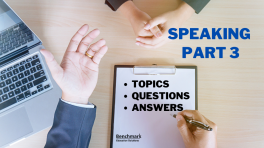- IELTS
- Practice Test
- IELTS Speaking Test: 7 Essential Tips


Walking into your IELTS speaking test can be scary, especially if you feel unprepared. In order to manage your nerves, follow our Benchmark IELTS experts’ tips to achieve a better IELTS band score.
Table of Contents
1. Be prepared
Preparation, preparation, preparation! There are lots of resources to help you do this:
- Watch online videos of IELTs Speaking Part 1, 2 & 3
- Study model answers (link to speaking test Q&A)
- Practise Speaking Questions Part 1, 2 & 3
- Learn appropriate vocabulary for the most common subjects
- Record yourself speaking
- Practice with an expert IELTS Speaking assessor (link to speaking assessment booking)
- Identify your strengths and weaknesses
Practice is the key to your confidence – you can never practise too much!
2. Don’t memorise your answers
Preparing the subjects and possible questions will be useful – but don’t learn them word for word. This will sound unnatural and the examiner will give you a more negative band score if they think you are not responding instantaneously.
3. Use a range of appropriate vocabulary
Your vocabulary and tone should be appropriate for the IELTS speaking exam questions. For example, “What do you spend time doing with your friends?”
It would be unusual to use formal or complex language in your response here. Phrases like ‘to hang out’ ‘chill out’ or to ‘have fun’ would be more suitable. You can express preference in this type of question by using expressions such as ‘I’d rather’ or ‘I’m keen on.’
You can check out subject specific IELTS vocabulary topics with our extensive word lists.
4. Use a range of grammar structures
There is one easy way to use the appropriate grammar – LISTEN TO THE QUESTION!
Q: Where is your hometown?
A: Use the present simple and lots of describing words
Q: Do you think you will live there when you are older?
A: Give your opinion, make predictions and use the future simple
Q: Have you ever bought something on the internet?
A: Use the present perfect to describe experiences in the past when you don’t say exactly when they happened. When talking about specific events, change to the past simple e.g. I bought a laptop last year….
Q: What would you like to change about your daily routine?
A: A conditional. When describing a hypothetical situation use the language of unreal conditionals (would + infinitive verb). Your vocabulary should focus on phrases connected to daily routine.
Remember! The answer is IN the question!
5. Be confident and friendly/Show interest
Smile, think positively and give it all you’ve got! The examiner will be impressed by your ability to interact with others. Listen carefully and respond to the question with appropriate expressions like, “that’s a difficult question” or “Hmm, I haven’t really thought about it before.”
Make good eye contact with the examiner to show them you are confident, even if your insides are like jelly!
6. Be yourself
It is easier to speak about subjects you believe in and your own opinion. So, ask yourself ‘What do I really think?’ You don’t need to use big words that you feel uncomfortable with. Your fluency and being comfortable with the vocabulary you use is more important. There is no correct answer to the exam questions and it is not a job interview – so say what you think!
7. Remember nobody is perfect
The examiners meet candidates with all levels of English. Try not to compare yourself with others – there is no correct answer to the questions and the IELTS examiner will expect you to make mistakes. If you make a mistake, correct it and/or move on. Don’t worry about it – errors are completely normal.
Another way to train is to try a complete trial speaking assessment with our friendly team of experts – practice makes perfect!










